

News & Commentary
Vatican says pope has not accepted invitation to go to russia.
- March 21, 2024
- News & Commentary
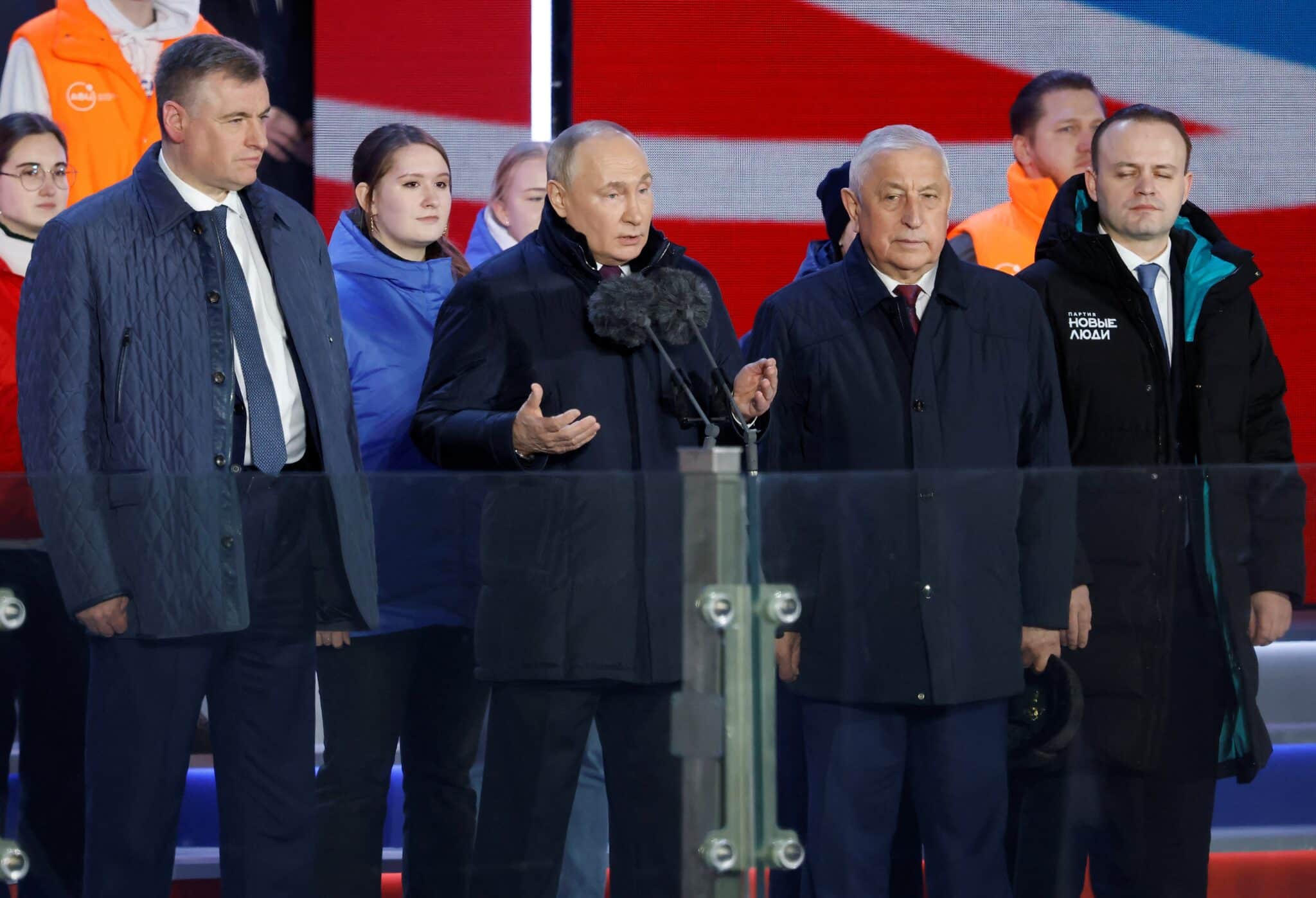
VATICAN CITY (CNS) — Pope Francis has not accepted an invitation to travel to Moscow in June to meet with Vladimir Putin, the director of the Holy See press office said.
A report on the website of Intelligence Online, a French journal, “does not correspond to the truth,” Matteo Bruni told reporters March 20.
A story on the website March 19 had said Ivan Soltanovsky, the Russian ambassador to the Holy See, invited the pope to meet Vladimir Putin in Moscow in June, “an invitation that the pope accepted,” Intelligence Online had reported.
The journal said the pope, who repeatedly has been invited to visit Ukraine, would travel to Kyiv immediately after visiting Moscow.
After Russia launched its large-scale invasion of Ukraine in February 2022, Pope Francis said he would be willing to accept the invitation of the Ukrainian government to visit, but only if he could visit Moscow as well.
Earlier the Russian news agency RIA Novosti had reported that Pope Francis had congratulated Putin on his victory in the presidential election March 17, an election Western observers described as rigged. Bruni had told Catholic News Service March 18 that the report was not true.
The Vatican has repeatedly offered to act as a mediator between Ukraine and Russia, and last year Pope Francis sent his peace envoy for Ukraine, Italian Cardinal Matteo Zuppi of Bologna, to Kyiv, Moscow, Washington and Beijing to meet with foreign leaders and advance peace talks on Ukraine.
In early March, however, the pope caused consternation when segments of an interview were released in which he said Russia and Ukraine need to have the “courage of the white flag” to halt the fighting and negotiate.
The phrase “white flag” usually refers to surrendering, and Ukrainian leaders were outraged.
Pope Francis was not asking Ukraine to consider surrendering to Russia when he called for negotiations to end the war, but he was calling for both Russia and Ukraine to cease hostilities and engage in peace talks, said Cardinal Pietro Parolin, Vatican secretary of state.
At the end of his weekly general audience March 20, praying for peace in Ukraine and in the Holy Land, Pope Francis said, “War is always a defeat.”
“We must make every effort to discuss, to negotiate to end war,” he said. “Let’s pray for this.”
By Cindy Wooden | Catholic News Service

Our Mission
- Phone: (513) 241-5615
- Address: 28 W. Liberty St. Cincinnati, OH 45202
Writer’s Guidelines Privacy Policy Post a Prayer Request Donor Portal Our Mission Sitemap
Recent Articles

Serving God in Small Ways
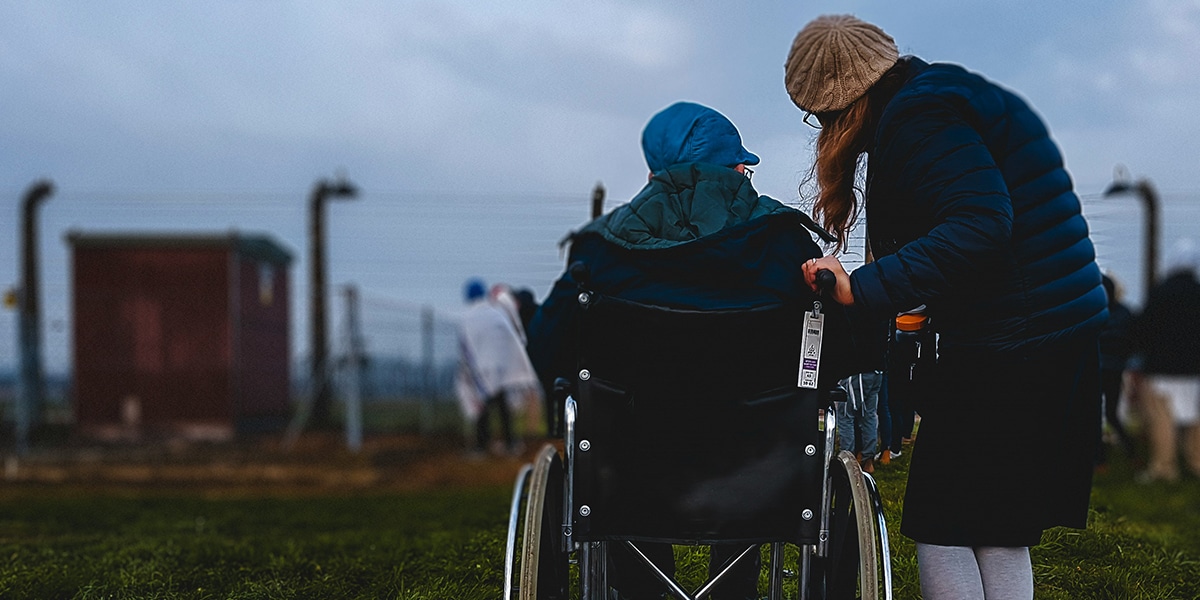
Holy and Worthy of Care

Let’s Play

Living the Truth
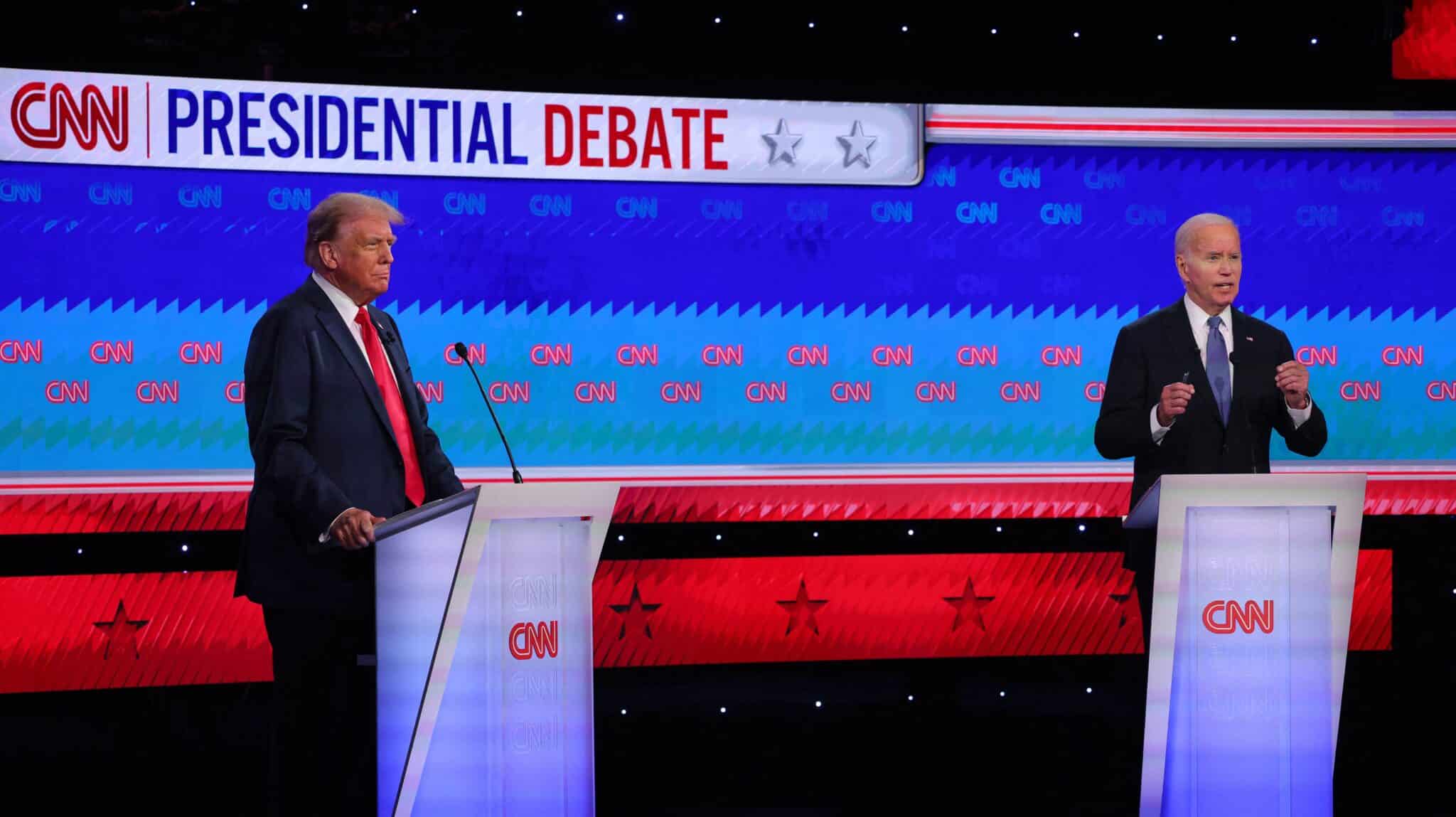
Biden, Trump spar over abortion, migrants and each other in first presidential debate
Pope makes surprise visit to Russian Embassy to the Vatican
The visit came as a surprise as it did not follow typical protocol.
The Vatican press office confirmed that Pope Francis made a visit to the Russian Embassy to the Holy See to express his concern about the fighting in Ukraine on Friday morning.
The Russian Embassy to the Holy See is a short distance outside of Vatican City situated on the road leading into St. Peter's Square, and this was seen by most as a strong personal papal initiative.
Aside from saying the visit lasted just over an hour, the Vatican provided no further information nor distributed any video or photographs. The pope was seen leaving the embassy building seated in the front seat of a small, white car.
MORE: Russia-Ukraine live updates
Ambassador Aleksandr Avdeyev, the Russian diplomat at the embassy, told Russian media that "the pope personally wanted to ask about the situation in Donbas and Ukraine" and expressed his great concern about the humanitarian situation and conditions of the population. He reportedly urged for the care of children, the sick and the people who were suffering.
The pope's surprise and unprecedented visit to the embassy took many Vatican watchers by surprise, as it is normal protocol for ambassadors to come to the Vatican to meet with the pope. However, Pope Francis has in the past dropped in to see people in Vatican offices outside the walls of the tiny state when he has urgent matters he wishes to discuss.
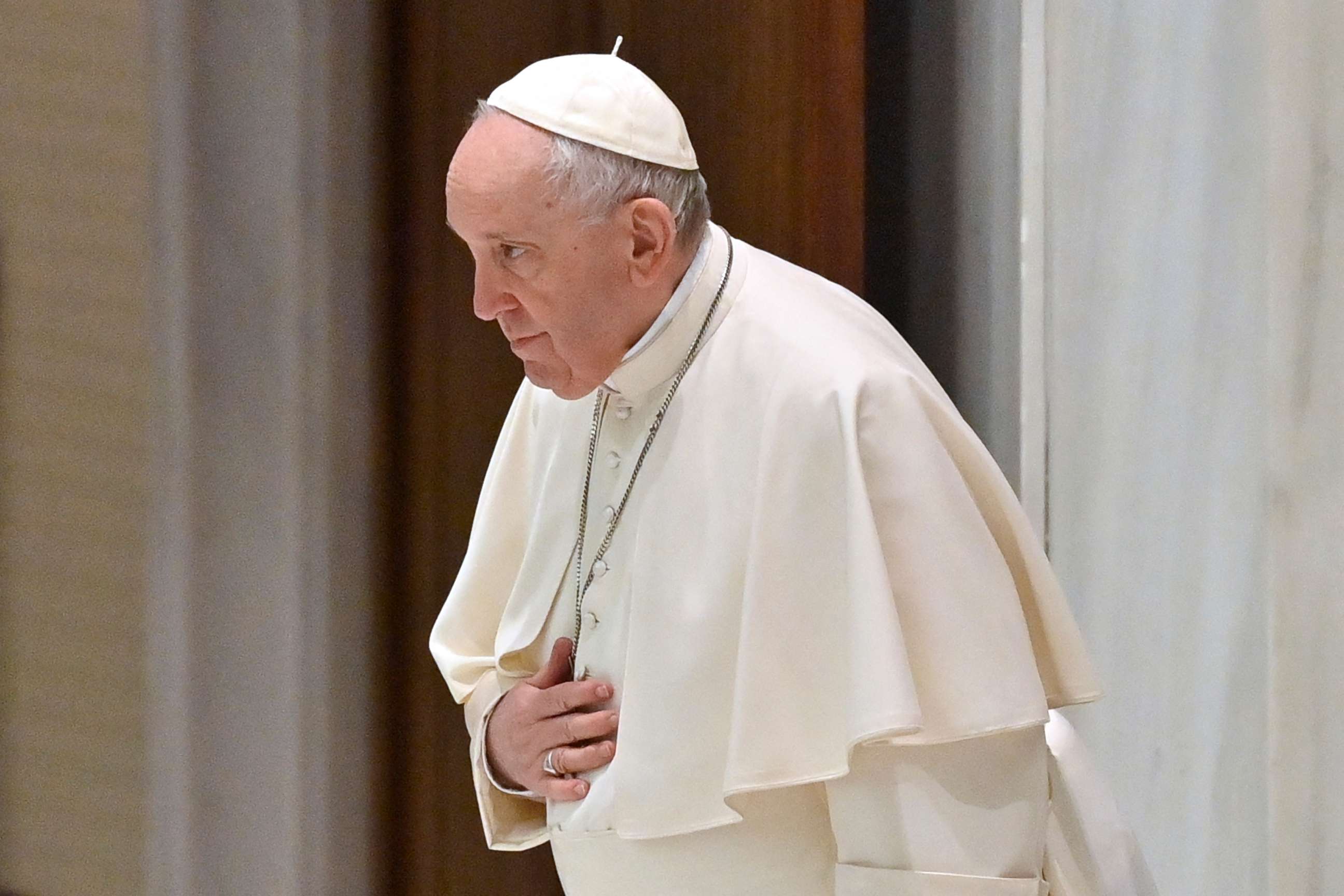
On Thursday, Cardinal Parolin, the Vatican's secretary of state, said in a video statement released after the start of Russian military operations in Ukraine that although the tragic scenarios everyone feared were becoming reality "there is still time for goodwill, there is still room for negotiation." He said he hoped those who hold the destiny of the world in their hands would have a "glimmer of conscience."
Commentators have noted that the pope and the Vatican have been careful about publicly criticizing and naming Russia, some say, so as not to antagonize the Russian Orthodox Church.
On Wednesday at the end of his general audience in the Vatican, Pope Francis called on believers and nonbelievers to pray and fast for peace in Ukraine on Ash Wednesday to combat the "diabolical insistence, the diabolical senselessness of violence," saying that "once again the peace of all is threatened by partisan interests."
MORE: Questions about the Ukraine-Russia conflict, answered
He appealed to those with political responsibilities to do a serious examination of conscience before God and urged world leaders to "refrain from any action that would cause even more suffering to the people, destabilizing the coexistence between nations and discrediting international law."
Earlier Friday, the Vatican press office announced the pope would not make his scheduled one-day trip to Florence Sunday and would have to skip the Ash Wednesday ceremony in the Vatican at the start of Lent due to a flare up of knee pain. His doctors have told him he needs a longer period of rest, but that did not seem to stop him making Friday's surprise visit.
Related Topics
- Catholic Church
Trending Reader Picks

Biden addresses poor debate performance
- Jun 28, 2:09 PM
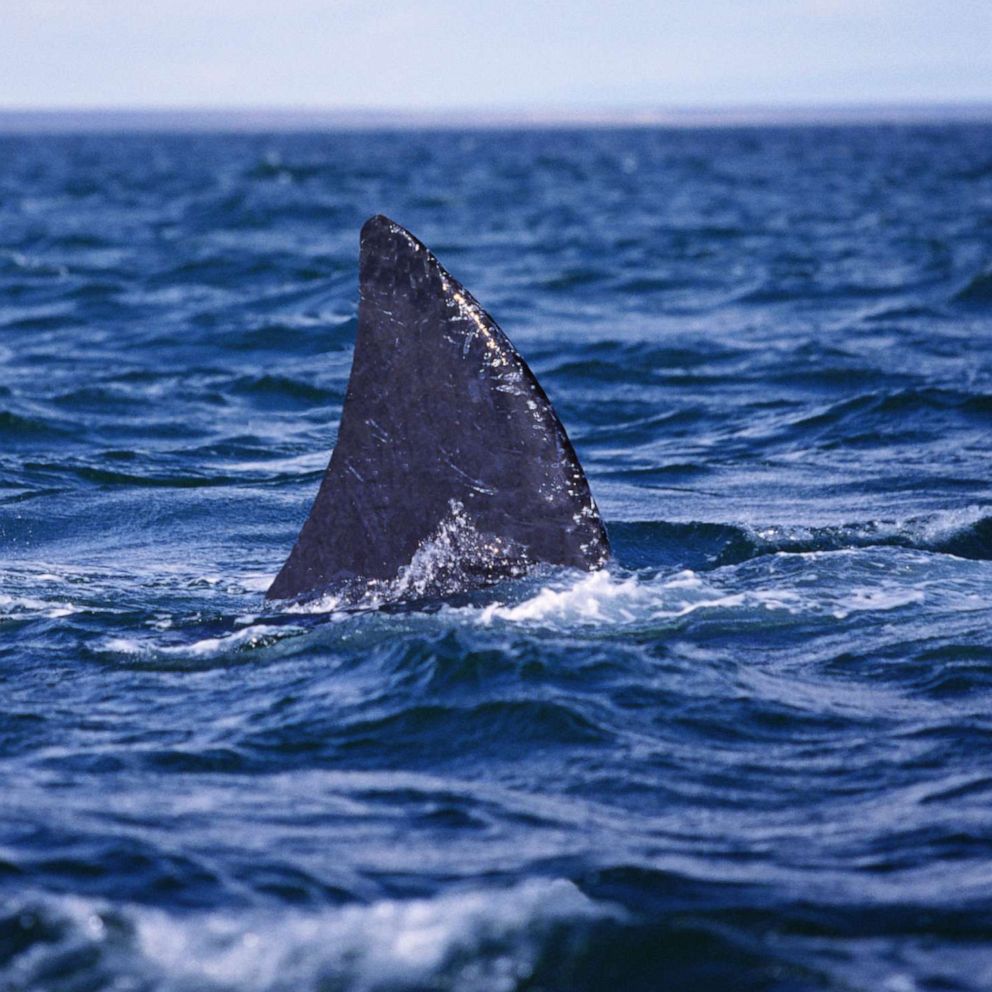
Shark attacks man while he's fishing in Florida
- Jun 28, 4:38 PM

SCOTUS sides with alleged Jan. 6 defendant
- Jun 28, 12:49 PM

Mother arrested in hot car death: Police
- Jun 28, 4:48 PM

Parents at beach with kids die in rip current
- Jun 21, 8:38 AM
ABC News Live
24/7 coverage of breaking news and live events
Advertisement
Supported by
Secret ‘Mission’ for Peace in Ukraine May Show Limits of Pope’s Influence
Since Francis made cryptic reference to a Vatican peace effort, the suggestion has elicited denial or bewilderment by war’s protagonists.
- Share full article

By Jason Horowitz
ROME — A secret mission revealed days ago by Pope Francis to bring peace between Russia and Ukraine is so secret that Russia and Ukraine claim to know nothing about it.
The Kremlin said on Tuesday that it had no idea what the pope was talking about. “Ukraine doesn’t know about it,” Ukraine’s ambassador to the Holy See, Andrii Yurash , said in an interview Wednesday, adding that he had scheduled a meeting for Thursday with the pope’s foreign minister. “I will for sure ask him what it is.”
Later Wednesday evening, the pope’s second-in-command and chief diplomat, Secretary of State Cardinal Pietro Parolin, told reporters, “to my knowledge, they were and are aware” of the peace plan, saying that the denial by the governments “surprises me.”
The apparent bewilderment of the war’s parties, and confusion around the existence of a plan contributed to the sense that the pope’s influence as a geopolitical player and peacemaker — already chastened in countries like Cuba, South Sudan and Myanmar — did not extend to Ukraine.
Some supporters of Ukraine worry that in his eagerness to play a constructive role, Francis may be reducing himself to a pawn for the likes of President Vladimir V. Putin of Russia or the Russian Orthodox Church, which has sought to give religious legitimacy to the invasion .
During a visit to Budapest last weekend, Francis met privately with Prime Minister Viktor Orban of Hungary, who has been a frequent defender of Russia, and a top Russian Orthodox Church prelate in Hungary, Metropolitan Hilarion. On the plane home, Francis was asked by journalists whether he thought the two men could accelerate the peace process or facilitate a meeting between Francis and Mr. Putin.
Francis answered with a cryptic reference to “a mission going on now, but it is not public yet” to bring peace, adding “when it is public I will talk about it.”
Asked about the comments, the office of Archbishop Paul Gallagher, the foreign minister, responded that since the “matter is under consideration,” it could not provide information for now, “but will do so in the near future.”
But what little is actually known about that effort has drawn either denial (the metropolitan on Wednesday said he had no conversation about a peace plan with Francis), bafflement or deep skepticism from informed observers.
“The pope is out of the picture,” said Lucio Carraciolo, the editor of the leading Italian foreign affairs journal Limes. In December, he organized an event at the Italian Embassy to the Holy See featuring Cardinal Parolin, who called for a “ European peace conference ” to help end the war.
“How can a Catholic pope be a mediator in an Orthodox environment?” Mr. Carraciolo said, adding that with Francis, the church “has no relevance in this kind of war.”
Still, the Vatican has actively tried to engage with both sides, working on prisoner releases and promising the Ukrainians that it would do what it could to help return children taken by Russia . One former Vatican official on Wednesday told the Italian press about a seven-point plan for a peace process that included getting major stakeholders around a table mediated by the Vatican.
Mr. Yurash, the Ukrainian ambassador, said the Vatican has consistently expressed a desire to be involved in an eventual peace negotiation, and that to do that, its officials told him, it had to keep open “bridges” and “lines” to Russia.
But he noted that the Kremlin had repeatedly stymied Vatican overtures for a papal meeting with Mr. Putin, which Francis has repeatedly said would be a prerequisite for a meeting with Ukraine’s president, Volodymyr Zelensky.
Mr. Yurash argued the Russian Orthodox Church was trying to gain “legitimacy” through its relationship with the Vatican for “obvious aims of Russian propaganda.”
“It’s not absolutely clear for my side why the Holy See is always trying to still continue this very special relation with the Russian church and the Russian state,” he said, adding that the Ukrainian people, already suffering under an invasion, “cannot understand” the pope’s positioning.
Francis has repeatedly recalled that on the first day of the war he called Mr. Zelensky, and then, to make what he has called a “clear gesture” of his openness to talk, visited Aleksandr Avdeyev, the Russian ambassador to the Holy See.
On the flight back from Budapest he called Mr. Avdeyev “a great man, a man comme il faut, a serious, cultured and balanced person.”
Mr. Avdeyev did not return a request for comment.
Francis’ openness to dialogue has also, especially in the beginning of the war, drawn criticism for assuming a neutrality that critics considered morally questionable in the face of clear Russian aggression.
The pope’s early reluctance to name Russia as the aggressor eventually led to criticism from Ukraine and warnings that he was in danger of ending up on the wrong side of history, with historians invoking Pius XII, who stayed essentially silent about Hitler’s Holocaust.
In May 2022, Francis wondered in an interview with the Corriere della Sera, an Italian newspaper, whether “NATO barking at Russia’s doors” may have “facilitated” anger from the Kremlin that led to the invasion.
But in the same interview, he seemed to damage his status as an honest broker when he said he had pointed out to Patriarch Kirill I, the leader of the Moscow-based Russian Orthodox Church, who he spent years courting to mend a split between the Western and Eastern churches going back to 1054, “the patriarch cannot be transformed into Putin’s altar boy.”
After eventually condemning Russia as the aggressor, Francis has since compared Russia’s behavior to massacres under Stalin and has consistently supported Ukrainians and called attention to their plight.
But Mr. Carraciolo said, the pope’s differing views could charitably be characterized as a “puzzle” that generated confusion and effectively disqualified the pontiff as a potential interlocutor.
Revealing an effort after meeting with players closer to the Russian side in Budapest was “not smart,” he said, also adding, “if it’s secret, you have to keep it secret.”
Since the beginning of his pontificate, Francis has thrown himself into real conflicts in the hopes of having a real, and not just moral, impact on the world stage. But after early success in playing a role in a historic diplomatic breakthrough between Cuba and the United States in 2015, his efforts have rarely borne fruit.
Cuba, where he has sent an envoy to secure the release of political prisoners, has not freed them. In 2019, he knelt in the Vatican and kissed the feet of the warring leaders of South Sudan, imploring them to stop a yearslong civil war. But in February, he upbraided the leaders in the country’s capital, Juba, for slipping back into violence.
Flavio Lotti, who organizes a yearly peace march from Perugia to Assisi, said that the pope’s strong voice on issues of peace, disarmament and support for migrants, “makes Francis unique, but doesn’t make him stronger.”
Still, Mr. Lotti said Francis served as an important “lighthouse” for everyone who seeks to put “the conditions of real people also at the heart of geopolitical problems. It’s in the trying.”
While even some supporters of Francis worry he risks coming off as geopolitically impotent if no plan materializes or gets traction, it is clear for now that the pope had again become a center of attention. Mr. Yurash said he had received a barrage of calls from fellow ambassadors to the Vatican, including from the United States, asking what he knew.
As the ambassador showed pictures in his office of himself with Francis and Cardinal Parolin and pointed out a stuffed animal, shredded in a Russian attack, that he hoped to give to the pope as a reminder of the suffering of the country’s children, his phone rang.
“The Polish ambassador,” he said, excusing himself. “Everybody is calling me.”
Jason Horowitz is the Rome bureau chief, covering Italy, the Vatican, Greece and other parts of Southern Europe. He previously covered the 2016 presidential campaign, the Obama administration and Congress, with an emphasis on political profiles and features. More about Jason Horowitz
Color Scheme
- Use system setting
- Light theme
Pope Francis ready to visit Ukraine and Russia
German Press Agency
ROME – Pope Francis says he is willing to travel to Ukraine, which is under attack from Russia, but only on the condition that he can also travel to Moscow.
“I will go to both places or to neither,” the head of the Catholic Church said in an interview with Saturday’s edition of the Argentinian newspaper La Nacion.
The war in Ukraine could only be ended through dialogue and concrete peace initiatives, he said. The pontiff, 86, was already considering a trip to the countries last summer. At that time he also said he would like to visit Kyiv and Moscow.
The Vatican has long sought to play a mediating role in the conflict – in this context, he spoke to La Nacion of the “desire to serve peace.” In the interview, Francis reported how he had asked Russian leaders whether he could travel to Moscow on the second day after the full-scale Russian invasion of Ukraine. Russian Foreign Minister Sergei Lavrov, he said, had declined with thanks at the time.
The pontiff reiterated his dismay at the war: “The war hurts me, that’s what I want to say. The war hurts me.”
In his public appearances and audiences, he regularly speaks of the suffering of Ukrainians. For diplomatic reasons, he does not mention Russia by name.
Hydropower is ready to step up to the plate against summer heat
Summer is nearly here and the Northwest has sprung to life as the days have grown longer and warmer.
Pope Francis’ secret Ukraine-Russia peace mission, explained

There are “new, but of course, confidential” developments in the Holy See’s mission to stop the war between Russia and Ukraine. Cardinal Pietro Parolin, the Vatican Secretary of State, broke the news of the “new” developments when he spoke to journalists at the Lateran University in Rome May 10, but he did not elaborate further. However, he added significantly, “I believe the peace mission will move forward.”
Pope Francis first revealed that a mission aimed at stopping the war between Russia and Ukraine “is underway” on April 30. In the following days, spokespersons for both Presidents Vladimir Putin and Volodymyr Zelensky said their respective sides knew nothing about such a mission. Cardinal Parolin, the pope’s right-hand man, challenged these denials on April 3 and said both sides were informed.
So, what is happening? Is there a peace mission? Why would Kyiv and Moscow deny any knowledge of it? What can we expect to happen next?
Ever since Russia invaded Ukraine on Feb. 24, 2022, Pope Francis has looked for ways to stop the war. To achieve that goal and serve as a mediator, he has sought to avoid taking sides. Nevertheless, he has stated clearly that Russia is the aggressor and several times a week speaks of “martyred Ukraine.” He has spoken out against the more than 430 days’ war on no less than 120 occasions, in speeches, homilies, press conferences and interviews.
Pope Francis’ relationship with President Zelensky
Since the war started, Pope Francis has spoken twice by phone (Feb. 26 and March 22) with President Zelensky, whom he had met face to face in the Vatican on Feb. 8, 2020. Moreover, he has received the Ukrainian prime minister and many parliamentarians in private audiences since the Russian invasion and has also met the wives of Ukrainian soldiers whose husbands were prisoners of war, and many refugees, including children.
The Holy See has had a nuncio, an ambassador, in Kyiv, the Lithuanian-born Archbishop Visvaldas Kulbokas, who has been there throughout the war and reports regularly on the situation to the pope and the Vatican.
Francis has had the Vatican engage in humanitarian initiatives during the war. He sent the Polish-born Cardinal Konrad Krajewski on several missions to Ukraine with various forms of humanitarian aid, including ambulances and thermal shirts. Francis has also been involved in the exchange of prisoners between Russia and Ukraine. Delegates from President Zelenskyy have brought the pope lists of names on at least five occasions, and he passed them onto the Russian authorities; many hundreds of prisoners have been released on both sides.
On the eve of his visit to Budapest, April 27, the Ukrainian prime minister, Denys Shmyhal, visited Francis in the Vatican and asked him to facilitate the return of thousands of Ukrainian children forcibly taken to Russia during the war. The pope promised to do everything possible in this regard.
These humanitarian efforts have been like stars in the dark night of war.
Pope Francis’ relationship with Vladimir Putin
Ever since the war started, Pope Francis has tried to make direct contact with President Putin, but so far without success. On the second day of the war, casting aside protocol, Francis visited the Russian embassy to the Holy See and asked the ambassador to convey a message to President Putin, saying he was willing to go to Moscow to speak with him, but the Russian leader has refused to have any direct contact with the pope since he launched the invasion. Instead, he had his foreign minister, Sergei Lavrov, respond to Francis saying his involvement was “not necessary.”
A follow-up phone call on the pope’s behalf on March 8, 2022, by Cardinal Parolin to Mr. Lavrov, repeating Francis’ call for a stop to the fighting, was equally unsuccessful.
Speaking to journalists Sept. 15, 2022, after his visit to Kazakhstan, Pope Francis, responding to criticisms for not calling out Putin, emphasized the need for dialogue, even if it means engaging “with states that have started a war.”
Pope Francis: “I don’t exclude dialogue with any sort of power that is at war, even if it is with the aggressor. It may ‘smell,’ but one has to do it."
He said, “I don’t exclude dialogue with any sort of power that is at war, even if it is with the aggressor. It may ‘smell,’ but one has to do it. But we must always be one step ahead, with an outstretched hand, always! Otherwise, we close the only reasonable door to peace.”
Returning from Budapest last month, Francis sought to explain his efforts to keep dialogue open. “I believe that peace is always made by opening channels; peace can never be made by closure. I invite everyone to open relationships, channels of friendship. ... This is not easy,” he said.
He said he had told this to various people, including Hungary’s prime minister, Viktor Orbán, whom he met in Budapest and who is the only leader of the European Union’s 27 states who is an ally of President Putin. Mr. Orbán refuses to allow arms to be transported to Ukraine across the 85-mile border between the two countries, and claims that he and Francis are the only leaders working for peace.
How Francis communicates with Russia
While Francis has been able to communicate directly and indirectly with President Zelensky since the war started, the same is not true with President Putin, whom he has met face to face three times (2013, 2015, 2019). They last spoke together when Putin phoned to wish him 85th birthday greetings in Dec. 2021. Since then, Francis said, his main line of communication has been through the Russian ambassador to the Holy See, Aleksandr Avdeyev. On the flight from Budapest, he said: “I have a good relationship with the ambassador who is now leaving; he has been the ambassador in the Vatican for seven years, he is a great man, a man comme il faut , a serious, cultured, and balanced person. My relationship with the Russians is mainly with this ambassador.”
The pope has communicated with the Kremlin also through Cardinal Parolin, the Vatican’s secretary of state, who met the Russian foreign minister, Sergei Lavrov, during the U.N. General Assembly in New York, Sept. 22, 2022.
Moreover, the Vatican has a nuncio in Moscow, the Italian Archbishop Giovanni d’Aniello, who has been there throughout the war and is able to report back to Rome.
Besides the formal diplomatic channels, Francis also tries to make use of non-diplomatic ones to communicate with the Russian leadership, and especially Russian Orthodox church officials, even though most of them, like Russian Orthodox Patriarch Kirill, are subservient to Putin. Only a small number of Orthodox priests have opposed the war and are reportedly now in prison.
Besides the formal diplomatic channels, Francis also tries to make use of non-diplomatic ones to communicate with the Russian leadership.
On March 16, 2022, Francis had a 40-minute conversation by Zoom with Kirill. An outspoken supporter of the war, the patriarch sought to defend the “special military operation” but Francis called on him to be a pastor, not “the acolyte of the state.” The pope’s remark upset Kirill, according to informed sources; they have not spoken directly to each other since. They were scheduled to have a face-to-face meeting in Jerusalem in June 2021, but Francis canceled that because of the war.
Since their Zoom conversation, Francis has communicated with Kirill through the chairman of the Department for External Church Relations of the Moscow Patriarchate, first Metropolitan Hilarion and, since June 2022, through his successor, Metropolitan Anthony of Volokolamsk.
Anthony visited the pope in the Vatican on August 5, 2022, and discussed Orthodox-Catholic relations in the context “of political processes taking place in the world.” Soon after, he let it be known that Kirill would not attend the Congress of World and Traditional Religions in Kazakhstan (Sept. 13-15) where Francis was scheduled to speak and where some had expected the patriarch and pope to have a face-to-face meeting.
On the plane from Budapest, Francis affirmed that the meeting with the patriarch “will happen” but gave no indication as to when that might be. Vatican sources, who asked not to be identified because they were not authorized to speak, told America that Francis is unlikely to meet Kirill until the war has ended.
Vatican sources, who asked not to be identified because they were not authorized to speak, told America that Francis is unlikely to meet Kirill until the war has ended.
In Budapest, Pope Francis received Metropolitan Hilarion in a 20-minute private audience. Hilarion had been Chairman of the Department for External Church Relations of the Moscow Patriarchate from 2009 to 2022 when he was demoted and reassigned to Budapest in June 2022, allegedly for his opposition to the war. Hilarion was succeeded by Antony. Francis has known Hilarion since 2013, they have met many times and on the plane he said: “Hilarion is someone I respect very much, and we have always had a good relationship. And he was kind enough to come and see me [in Budapest], then he came to the Mass, and I saw him here at the airport as well. Hilarion is an intelligent person with whom one can talk, and these relationships need to be maintained, because if we talk about ecumenism—I like this, I don't like this—we must have an outstretched hand with everyone, even receive their hand.”
Asked if he had talked about peace with Orbán and Hilarion, Francis said, in the meeting “We talked about all these things. We talked about this because everyone is interested in the road to peace. I am willing. I am willing to do whatever needs to be done. Also, there is a mission going on now, but it is not public yet. Let's see how....When it is public I will talk about it.”
Hilarion’s position is delicate, and in response to speculation in the media, he made clear on his website portal “there was nothing [at the meeting with Francis] concerning bilateral relations between the Roman Catholic Church and the Russian Orthodox Church. No political issues were discussed. The meeting was of a personal nature between two old friends.”
After Francis’ return to the Vatican, Metropolitan Anthony arrived in Rome (May 1-4) “with Patriarch Kirill’s blessing.” His visit, however, was for private business that was in no way related to the pope’s peace mission, Vatican sources told America . He met Archbishop Claudio Gugerotti, prefect of the Dicastery for the Oriental Churches, and greeted Pope Francis for a few minutes at the end of the Wednesday public audience in St. Peter’s Square. He also visited Bishop Brian Farrell, secretary of the Dicastery for the Promotion of Christian Unity, whom he has known for many years, but did not meet Cardinal Kurt Koch, the prefect of the dicastery, who was in Israel at that time.
Anthony’s presence in Rome and his greeting the pope sparked inevitable speculation in the media that it was linked to the peace mission, but Cardinal Parolin categorically denied this on the day of the audience saying, “It had nothing to do with this!”
Russia and Ukraine knew about Francis’ peace initiative
At the same time, Cardinal Parolin expressed surprise that spokespersons for the presidents of Ukraine and Russia claimed ignorance of the pope’s peace mission. Kremlin spokesman Dmitry Peskov told reporters May 2 that Moscow had no information about the initiative. CNN reported that an unnamed Ukrainian official close to the presidential office said: “President Zelensky has not consented to any such discussions on Ukraine’s behalf. If talks are happening, they are happening without our knowledge or our blessing.”
”I know that both parties have been informed,” Cardinal Parolin said May 3 , “to my knowledge, they were and are aware.” He added, “As far as I know, they know.”
The cardinal’s next remark, however, appeared to suggest that the pope’s first aim is to get both sides to agree to a ceasefire, before the peace process could start. ”I don't know if there are the conditions today for a ceasefire. Let's hope.... I believe that this initiative—if there will be one—by the Vatican should also go in that direction,” the cardinal said. Vatican Media reported that the cardinal went on to add that the hope is that a cessation of fighting might take place and that a peace process could follow.
On May 4, Kremlin spokesman Dmitry Peskov, quoted by RIA Novosti, a Russian state news agency, offered a more nuanced response to his original denial: “We know that the Pope is constantly thinking about peace and how to end this conflict, but we are not aware of any detailed plan proposed by the Vatican.”
“While Putin is not open to direct communication with the pope right now, the calculation here is that he may be more ready for this in some months’ if the war is not going his way.”
That both Russia and Ukraine would issue denials of a peace mission is to a certain degree comprehensible, as neither side wants to stop fighting at this moment. Ukraine wants to regain its lost territory before considering a peace plan and is about to launch a major military offensive to achieve that goal. Russia, for its part, wants to defend all the territory it has taken since 2014 and, if possible, make further gains. To say one is ready to discuss a ceasefire, much less a peace plan, would be equivalent to a sign of weakness on the Ukrainian part and would leave Russia in a stronger position since it holds Ukrainian territory. The Russians, too, do not want a ceasefire; they need to make further gains if they are to consolidate what they have already captured.
Sources told America that Francis wants to bring about a ceasefire as soon as possible, to stop the killing and destruction, before moving into the more problematic area of peace negotiations. One Vatican source said, “While Putin is not open to direct communication with the pope right now, the calculation here is that he may be more ready for this in some months if the war is not going his way.”
Some in Rome think Pope Francis may have in mind the all-out effort made by John Paul II in 2003 to prevent the war in Iraq. That year, the Polish pope sent the French Cardinal Roger Etchegeray to Baghdad to speak with Saddam Hussein. The Iraqi leader received him on February 15 and engaged in a conversation that appeared to offer a glimmer of hope for a last-minute way out of the crisis. Two weeks later, John Paul II dispatched the Italian Cardinal Pio Laghi, a friend of the Bush family, to Washington, D.C., to speak with President George W. Bush. When they met in the Oval Office on March 5, the cardinal handed Mr. Bush a personal letter from the pope, but the president put it on the table without opening it and went on to inform the cardinal that he believed he was “doing God’s will” by launching the war. President Bush’s mind was closed to mediation, and the negative consequences of his decision are still with us today, as Francis saw when he visited the country March 5-8, 2021.
The situation facing Francis is, of course, totally different from the one that faced John Paul II 20 years ago. President Putin has already launched the war and today, more than 430 days later, shows no intention of ending it. Nor does he show any sign of being open to a ceasefire proposal from Francis any more than President Bush was to John Paul II’s effort to prevent the war.
Pope Francis believes in the power of prayer, knowing that nothing is impossible for God. He believes “it is not impossible” for him to get to Moscow, as he told La Nación on March 10. He knows it is a steep, uphill task to get both sides to agree to a ceasefire, but he feels it is his moral duty to try, and also to seek to engage other heads of state and of international organizations in this effort.

Gerard O’Connell is America ’s Vatican correspondent and author of The Election of Pope Francis: An Inside Story of the Conclave That Changed History . He has been covering the Vatican since 1985.

Most popular

Your source for jobs, books, retreats, and much more.
The latest from america

- Asia - Pacific
- Middle East - Africa
- Apologetics
- Benedict XVI
- Catholic Links
- Church Fathers
- Life & Family
- Liturgical Calendar
- Pope Francis
- CNA Newsletter
- Editors Service About Us Advertise Privacy

Pope Francis meets with Russian ambassador to the Vatican

By Jonah McKeown
CNA Staff, Jun 25, 2024 / 13:45 pm
Pope Francis on June 22 met with Ivan Soltanovsky, Russia’s ambassador to the Holy See, in their first meeting since Soltanovsky presented his diplomatic letters to the pontiff last September.
Soltanovsky , a 69-year-old career diplomat, was appointed to his current role in May 2023. No details of the pair’s most recent meeting have yet been released.
Soltanovsky told Russia’s official Tass News Agency earlier this month that the Holy See remains one of the few global players who favor diplomacy, peace, and dialogue based on mutual respect and consideration of interests.
“In a situation where traditional methods of building peace no longer work, the Vatican has tirelessly been looking for new ways and opportunities and is willing, as Pope Francis said, to ‘think out of the box,’” the Russian diplomat told Tass.
Pope Francis has condemned Russia’s war of aggression and called for peace in Ukraine on numerous occasions but has also occasionally received criticism from Ukrainians for the way he has expressed himself. He has offered to act as a mediator between the two countries.
Pope Francis paid an unusual visit to Soltanovsky’s predecessor, Aleksandr Avdeyev, at the Russian embassy on Feb. 25, 2022, the day after Russia’s full-scale invasion began. The Vatican said the pope went to the embassy “to show his concern for the war.” Later, in September 2022, Pope Francis said he was involved in a prisoner swap between Russia and Ukraine, which involved calling Avdeyev “to see if something could be done, if an exchange of prisoners could be speeded up.”
In mid-2023, ahead of Soltanovsky’s appointment, Pope Francis asked Italian Cardinal Matteo Zuppi to serve as a papal envoy to “initiate paths of peace” between Russia and Ukraine. Zuppi has since made several diplomatic visits across the world to promote peace between Russia and Ukraine, including stops in Kyiv, Ukraine ; Moscow ; and Washington, D.C.
In recent weeks, prominent Vatican officials have reaffirmed the pope’s desire to maintain communication with both Russia and Ukraine. Secretary of State Cardinal Pietro Parolin also said the Holy See is greatly concerned about the tragic humanitarian consequences of the war “and is especially committed to facilitating the repatriation of children and encouraging the release of prisoners, especially seriously wounded soldiers and civilians.”
- Catholic News ,
- Pope Francis ,
- Vatican news ,
- Ukraine-Russia War

Subscribe to our daily newsletter
Our mission is the truth. join us.
Your monthly donation will help our team continue reporting the truth, with fairness, integrity, and fidelity to Jesus Christ and his Church.
You may also like

Vatican’s secretary of state rues Russia’s absence at Ukraine peace conference
“Peace is always made together,” Vatican Secretary of State Cardinal Pietro Parolin said June 19 as reported by Vatican News.

Ukrainian officials criticize Pope Francis’ ‘white flag’ remarks on Russia-Ukraine war
“Our flag is a yellow and blue one. This is the flag by which we live, die, and prevail. We shall never raise any other flags,” Ukraine’s foreign minister wrote.

Pope Francis appoints Gänswein to diplomatic role in Baltic states
The diplomatic appointment comes after months of speculation and rumor as to Gänswein’s future after the death of Pope Benedict XVI.
Press Herald
Account Subscription: ACTIVE
Questions about your account? Our customer service team can be reached at [email protected] during business hours at (207) 791-6000 .
- Nation & World
10 Ukrainians, imprisoned in Russia for years, return home after Vatican mediation
The former prisoners, wrapped in blue and yellow flags, reunited with families in Kyiv and called those who couldn’t be there. For some, the separation had lasted many years.

You are able to gift 5 more articles this month.
Anyone can access the link you share with no account required. Learn more .
With a Press Herald subscription, you can gift 5 articles each month.
It looks like you do not have any active subscriptions. To get one, go to the subscriptions page .
Loading....
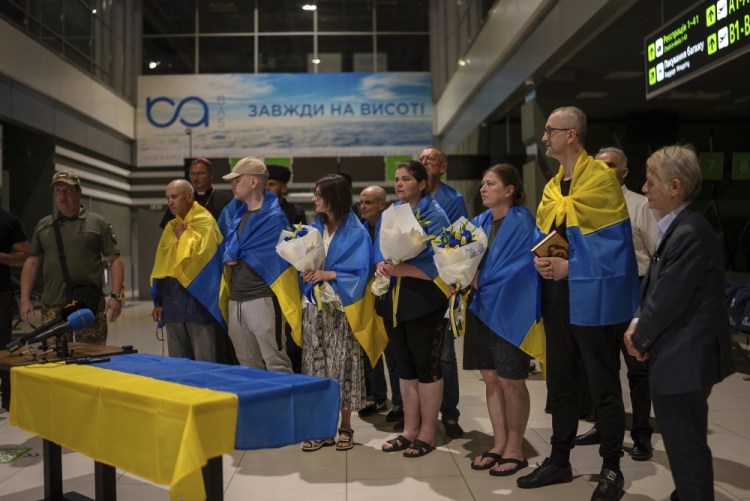
Nariman Dzhelyal, second right, deputy head of the Mejlis of the Crimean Tatar People stands among other prisoners who have been recently released in Kyiv airport, Ukraine on Saturday. Ten Ukrainians who had been held prisoners for years, were released from Russian captivity on Friday with a mediation of Vatican, said Ukraine’s President Volodymyr Zelensky. Alex Babenko/Associated Press
KYIV, Ukraine — Ten Ukrainian civilians held prisoner for years by Russia arrived in Kyiv overnight Saturday after the mediation of the Vatican, Ukraine President Volodymyr Zelensky said.
They were freed Friday. Some had been captured years before Russia’s full-scale invasion. The pope has said the Holy See has been involved in past prisoner swaps during the Ukraine war.
Among those freed was Nariman Dzhelyal, deputy head of the Mejlis, a representative body of Crimean Tatars that was relocated to Kyiv after Russia seized the peninsula in 2014. He was taken from Crimea, where he lived despite the annexation, one year before the war.
The chief of Mejlis, Refat Chubarov, and Crimean Tatar leader Mustafa Dzhemilev embraced him after nearly three years of captivity.
Dzhelyal said many Ukrainians remain in captivity: “We cannot leave them there because the conditions, both psychological and physical, are very frightening there.”
The former prisoners, wrapped in blue and yellow flags, reunited with families in Kyiv and called those who couldn’t be there. For some, the separation had lasted many years. Advertisement
“I really want to hug you. I’ll be with you soon, Mommy,” said Isabella Pekh, the daughter of freed art historian Olena Pekh, through a video call. “I’m so sorry I couldn’t meet you.”
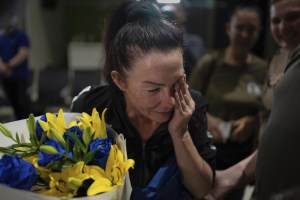
Olena Pekh, a researcher at Horlivka Art Museum, cries while she speaks to her daughter via videosignal in Kyiv airport, Ukraine on Saturday. Alex Babenko/Associated Press
For almost six years, Isabella Pekh spoke at international conferences and appealed to ambassadors for help in freeing her mother, who was detained in the occupied part of the Donetsk region.
“It was six years of hell that words cannot describe. But I knew I had my homeland, I had people who loved me, I had my daughter,” Olena Pekh said.
Two Ukrainian Greek Catholic priests were among those freed. One, Bohdan Heleta, was detained in 2022 in his church in the occupied city of Berdiansk in the southeastern region of Zaporizhzhia.
“There are a lot of our men and women there,” Heleta said of those who remain imprisoned. “They need help, concrete help. They are waiting for it.”
Pope Francis in an address on Saturday called for the release of all prisoners in the war and thanked God for the liberation of the two priests. Advertisement
Zelensky in a post on X wrote “I am grateful to everyone who helped. I thank our team for working to free the prisoners. I also want to acknowledge the efforts of the Holy See in bringing these people home.”
According to Ukraine’s Coordination Headquarters for the Treatment of Prisoners of War, 3,310 Ukrainians have already been released from Russian captivity since Russia’s full-scale invasion. Many thousands, both civilians and military personnel, remain imprisoned.
Associated Press reporter Giada Zampano in Rome, Italy, contributed to this report.
Modify your screen name
Join the Conversation
Please sign into your Press Herald account to participate in conversations below. If you do not have an account, you can register or subscribe . Questions? Please see our FAQs .
Your commenting screen name has been updated.
Send questions/comments to the editors.
Corrections union wants Cumberland County sheriff removed from office
Jury rules landlord can’t evict former portland mayor strimling, spiritual leader gurudev sri sri ravi shankar to visit portland, faa investigates near-collision at portland jetport, fruit flies end strawberry season early for some maine farms, evening express.
- Email address
- Comments This field is for validation purposes and should be left unchanged.
Member Log In
Please enter your username and password below. Already a subscriber but don't have one? Click here .
Not a subscriber? Click here to see your options

10 Ukrainians held prisoner for years in Russia return home after Vatican mediation
The Associated Press
June 29, 2024, 12:33 PM
- Share This:
- share on facebook
- share on threads
- share on linkedin
- share on email
KYIV, Ukraine (AP) — Ten Ukrainian civilians held prisoner for years by Russia arrived in Kyiv overnight Saturday after the mediation of the Vatican, Ukraine President Volodymyr Zelenskyy said.
They were freed Friday. Some had been captured years before Russia’s full-scale invasion . The pope has said the Holy See has been involved in past prisoner swaps during the Ukraine war.
Among those freed was Nariman Dzhelyal, deputy head of the Mejlis, a representative body of Crimean Tatars that was relocated to Kyiv after Russia seized the peninsula in 2014. He was taken from Crimea, where he lived despite the annexation, one year before the war.
The chief of Mejlis, Refat Chubarov, and Crimean Tatar leader Mustafa Dzhemilev embraced him after nearly three years of captivity.
Dzhelyal said many Ukrainians remain in captivity: “We cannot leave them there because the conditions, both psychological and physical, are very frightening there.”
The former prisoners , wrapped in blue and yellow flags, reunited with families in Kyiv and called those who couldn’t be there. For some, the separation had lasted many years.
“I really want to hug you. I’ll be with you soon, Mommy,” said Isabella Pekh, the daughter of freed art historian Olena Pekh, through a video call. “I’m so sorry I couldn’t meet you.”
For almost six years, Isabella Pekh spoke at international conferences and appealed to ambassadors for help in freeing her mother, who was detained in the occupied part of the Donetsk region.
“It was six years of hell that words cannot describe. But I knew I had my homeland, I had people who loved me, I had my daughter,” Olena Pekh said.
Two Ukrainian Greek Catholic priests were among those freed. One, Bohdan Heleta, was detained in 2022 in his church in the occupied city of Berdiansk in the southeastern region of Zaporizhzhia.
“There are a lot of our men and women there,” Heleta said of those who remain imprisoned. “They need help, concrete help. They are waiting for it.”
Pope Francis in an address on Saturday called for the release of all prisoners in the war, and thanked God for the liberation of the two priests.
Zelenskyy in a post on X wrote that “I am grateful to everyone who helped. I thank our team working to free the prisoners. I also want to acknowledge the efforts of the Holy See in bringing these people home.”
According to Ukraine’s Coordination Headquarters for the Treatment of Prisoners of War, 3,310 Ukrainians have already been released from Russian captivity since Russia’s full-scale invasion. Many thousands, both civilians and military personnel, remain imprisoned.
Associated Press reporter Giada Zampano in Rome, Italy, contributed to this report.
Follow AP’s coverage of the war in Ukraine at https://apnews.com/hub/russia-ukraine
Copyright © 2024 The Associated Press. All rights reserved. This material may not be published, broadcast, written or redistributed.
Related News
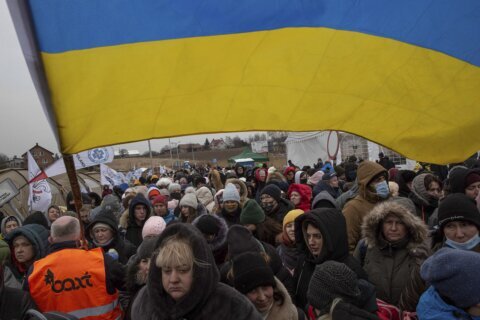
7 killed and dozens wounded after missiles slammed into a town in southern Ukraine, officials say
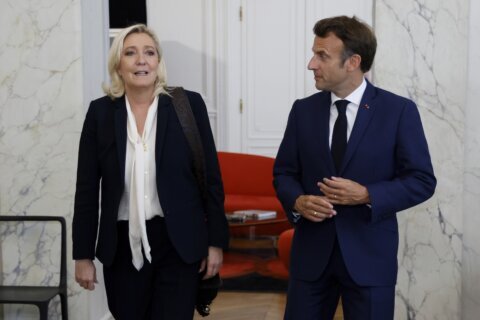
France’s exceptionally high-stakes election has begun. The far right leads preelection polls

Hungary’s populist Orbán to take over EU presidency as many issues hang in the balance
Recommended.
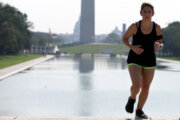
Extremely hot day with potential evening storms expected in DC region

'I kept it very secret': One trans woman's journey transitioning in the military after 'Don't Ask, Don't Tell' repeal

DC United ties Red Bulls 2-2 after Cristian Dájome gets red card, is sent off field
Related categories:.
Pope acknowledges his Russia comments were faulty
- Medium Text
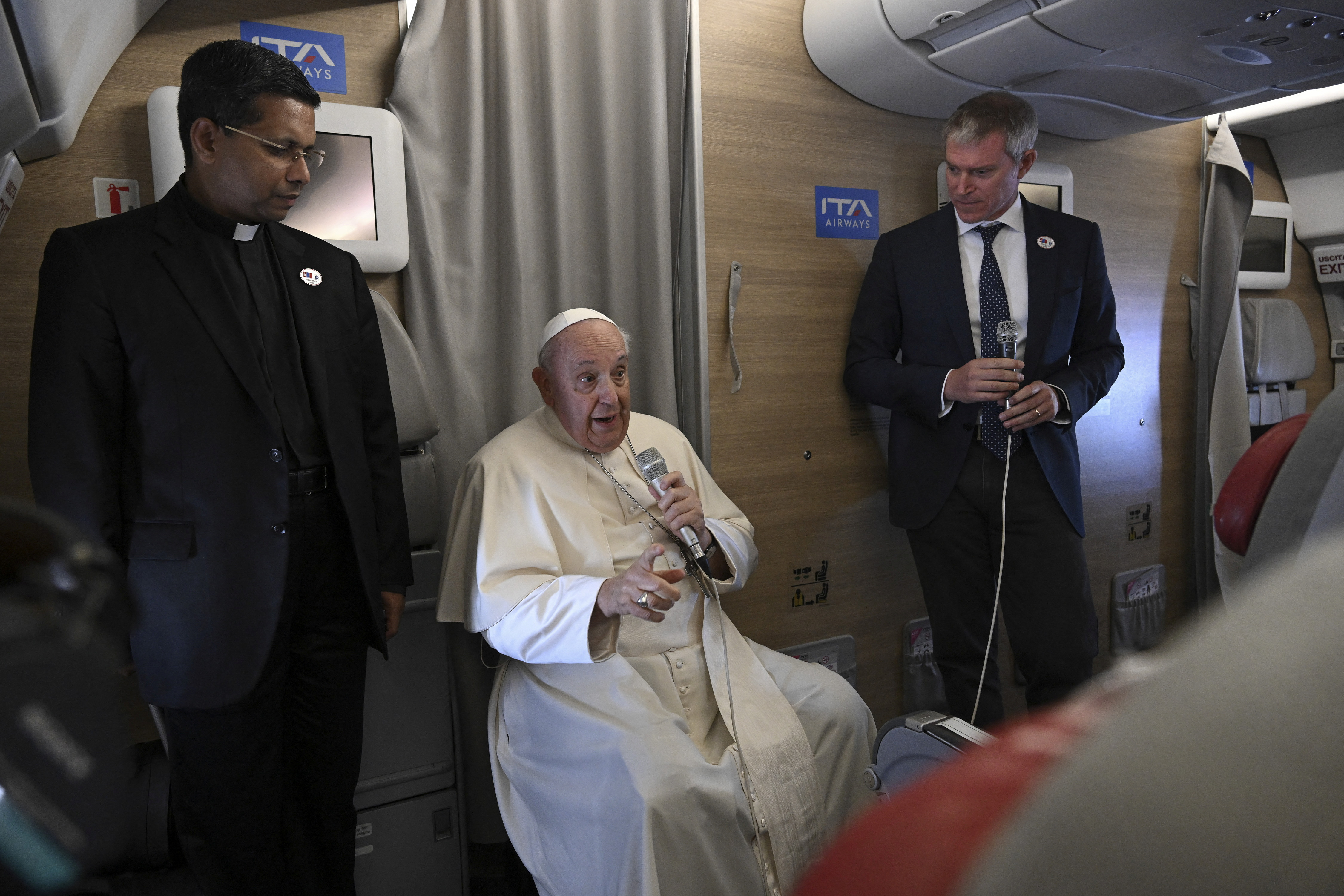
- Pope's comments on Russia upset Ukraine, pleased Kremlin
- China featured regularly on Mongolia trip
- Pope says China has nothing to fear from Catholic Church
- Pope, 86, says travelling is getting harder
CHURCH NOT A FOREIGN POWER
Sign up here.
Reporting by Philip Pullella
Our Standards: The Thomson Reuters Trust Principles. New Tab , opens new tab
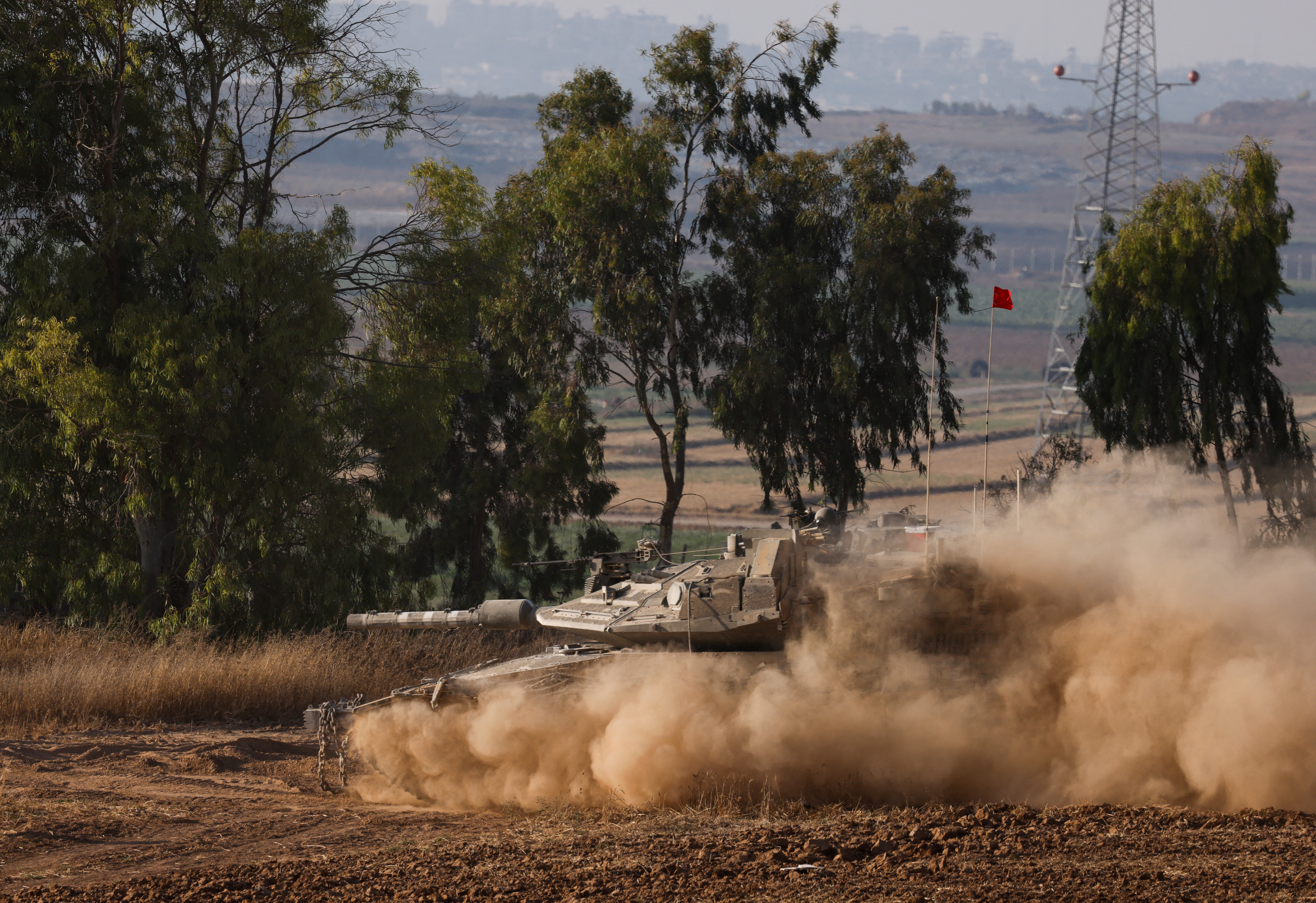
World Chevron
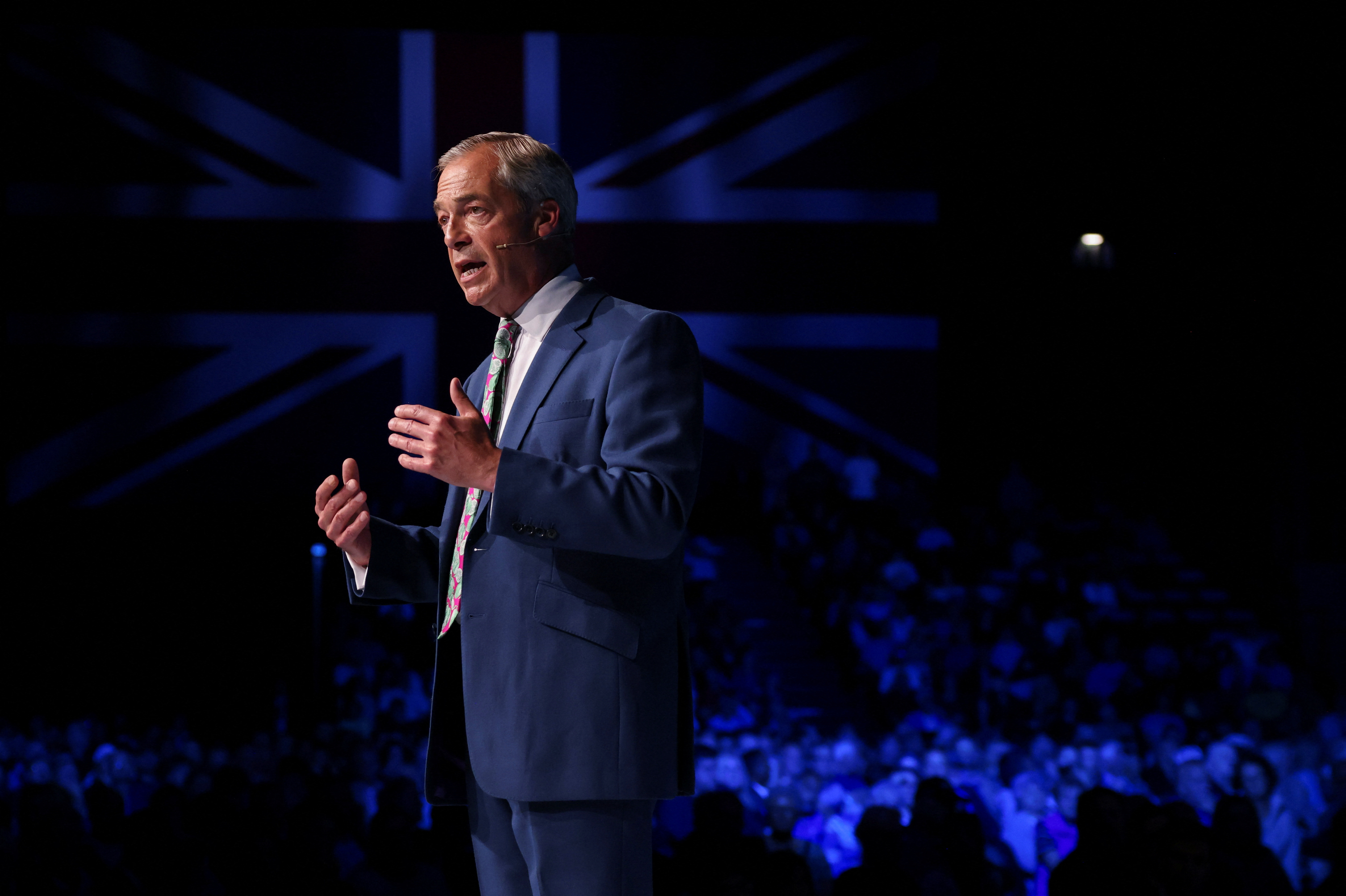
Pope prays for worldwide release of prisoners of war
By Francesca Merlo
As Ukraine and the Holy See celebrate the release of ten Ukrainian prisoners by Russian forces, Pope Francis prayed that "all prisoners of war return home soon".
At the end of his Angelus prayer for the solemnity of Saints Peter and Paul on Saturday, 29 June, the Holy Father's thoughts, in particular, turned to the two Greek-Catholic priests who were released as part of the prisoner swap.
On Friday evening, Fathers Ivan Levytskyi and Bohdan Heleta, both members of the Congregation of the Most Holy Redeemer, were released by Russia along with eight others in a prisoner exchange with Ukraine.
Pope Francis on Saturday also invited all those present to pray together that all prisoners return home. At the same time, he reflected "with pain" on the "brothers and sisters suffering because of war".
"Let us think of all the people wounded or threatened by the fighting", said the Pope, asking that God may "free them and sustain them in the struggle for peace".
Thank you for reading our article. You can keep up-to-date by subscribing to our daily newsletter. Just click here

More upcoming events:
The Pope's Agenda

Listen to our podcasts

Subscribe to our newsletters
To get the latest news

Papal audiences

Daily readings

Saint of the day

- Election 2024
- Entertainment
- Newsletters
- Photography
- Personal Finance
- AP Investigations
- AP Buyline Personal Finance
- AP Buyline Shopping
- Press Releases
- Israel-Hamas War
- Russia-Ukraine War
- Global elections
- Asia Pacific
- Latin America
- Middle East
- Election Results
- Delegate Tracker
- AP & Elections
- Auto Racing
- 2024 Paris Olympic Games
- Movie reviews
- Book reviews
- Financial Markets
- Business Highlights
- Financial wellness
- Artificial Intelligence
- Social Media
Defendant in Vatican trial takes case to UN, accuses pope of violating his rights with surveillance
FILE - Pope Francis during his weekly general audience in St. Peter’s Square at The Vatican, on Oct. 18, 2023. One of the defendants in the Vatican’s big financial trial has formally complained to the United Nations that Pope Francis violated his human rights by authorizing wide-ranging surveillance during the investigation. (AP Photo/Alessandra Tarantino, File)
- Copy Link copied
NEW YORK (AP) — One of the defendants in the Vatican’s big financial trial has filed a formal complaint with the United Nations, alleging that Pope Francis violated his human rights by authorizing wide-ranging surveillance during the investigation.
A lawyer for Raffaele Mincione, a London-based financier, submitted a complaint last week to the U.N. Office of the High Commissioner for Human Rights via a special procedure that allows individuals or groups to provide the U.N. with information about alleged rights violations in countries or institutions.
The Vatican on Thursday rejected the claim, saying the investigation followed all relevant laws and international agreements and that no surveillance was ordered for Mincione.
The filing marks the latest and highest-profile complaint about the Vatican trial, highlighting the peculiarity of the Vatican’s criminal justice system and its seeming incompatibility with European and democratic norms. The Vatican is an absolute monarchy where the pope wields supreme legislative, executive and judicial power.
The trial, which opened in 2021 and ended in December , focused on the Holy See’s money-losing 350 million euro investment in a London property but also included other tangents. Vatican prosecutors alleged brokers and Vatican officials fleeced the Holy See of tens of millions of euros in fees and commissions, and then extorted the Holy See for 15 million euros ($16.5 million) to cede control of the property.
The trial ended in December with convictions for nine of the 10 defendants, including Mincione and a once-powerful cardinal, Angelo Becciu. The court’s motivations for the sentence still haven’t been published, but both Vatican prosecutors and the nine convicted defendants have announced appeals.
Mincione’s complaint to the U.N. focused on the role of the pope during the investigation, an area that was flagged as problematic by defense lawyers during the trial and external experts in its aftermath .
The complaint cited four secret executive decrees Francis signed in 2019 and 2020 that gave Vatican prosecutors wide-ranging powers to investigate, including via unchecked wiretapping and to deviate from existing laws. The decrees only came to light right before trial, were never officially published, provided no rationale or timeframe for the surveillance, or oversight of the wiretapping by an independent judge.
The chief prosecutor argued Francis’ decrees provided unspecified “guarantees” for the suspects, and the judges rejected the defense motions at the time that claimed they violated the fundamental right to a fair trial. In a somewhat convoluted decision, the judges ruled that no violation of the principle of legality had occurred since Francis had made the laws.
In a statement responding to media inquiries about the U.N. filing, the Vatican prosecutors’ office said Mincione and others had been convicted of serious crimes in a trial “where due process was fully observed and where he abundantly exercised his right to be heard.”
The prosecutor said the investigation respected all laws and international agreements and didn’t actually involve ordering the use of intercepts of Mincione’s phone or electronic communications.
Mincione’s complaint also alleged the tribunal is not independent or impartial, a claim the Vatican has rejected previously. Francis can hire and fire judges and prosecutors, and recently decided such things such as their compensation, pension and term limits.
It is not clear what, if anything, the U.N. will do with the complaint. The Geneva-based office fields special rapporteurs, or experts, to monitor specific areas of human rights, including the judiciary and independence of judges and lawyers.
Previous complaints to the U.N. human rights office about the Vatican or Catholic Church, in the areas of child sexual abuse and LGBTQ+ discrimination, resulted in letters from the U.N. special rapporteur to the Vatican’s U.N. ambassador in Geneva listing problems and requesting responses and changes.
Mincione has also tried to engage the Council of Europe on the matter, given the Holy See is subject to periodic review as part of the COE’s Moneyval process to guard against money laundering. In January, a British representative asked if the COE would look into the Vatican’s human rights situation given the trial outcome.
The plenary assembly chairman dodged the question.
In ongoing litigation, Mincione has also sued the Vatican secretariat of state in a British court over the reputational harm he says he suffered as a result of the Vatican trial.

IMAGES
COMMENTS
Again the Pope looked to Moscow for the possibility of working together with Patriarch Kirill of the Russian Orthodox Church. He cited the 40-minute conversation via Zoom on 15 March last and the "justifications" for the war cited by Kirill, and returned to the missed appointment in June in Jerusalem. "I listened," said Pope Francis in the ...
After Russia launched its large-scale invasion of Ukraine in February 2022, Pope Francis said he would be willing to accept the invitation of the Ukrainian government to visit, but only if he ...
March 21, 2024. OSV News. News & Commentary. VATICAN CITY (CNS) — Pope Francis has not accepted an invitation to travel to Moscow in June to meet with Vladimir Putin, the director of the Holy See press office said. A report on the website of Intelligence Online, a French journal, "does not correspond to the truth," Matteo Bruni told ...
France, Russia, Vatican Vatican keen to bring Russian and French sherpas to the negotiating table. After putting out feelers in different European capitals, Pope Francis' team is hoping to bring the French and Russian presidential diplomatic advisers at the Vatican together to discuss Ukraine. The invitation was welcomed by Moscow.
Cardinal Matteo Zuppi is on a mission to Russia as the Pope's envoy for peace. On 29 June he meets with the Russian Patriarch Kirill of Moscow. On Wednesday he held talks with Yuri Ushakov, the presidential advisor for foreign policy and met with Catholic bishops in the Nunciature. By Linda Bordoni and Salvatore Cernuzio.
VATICAN CITY (AP) — Russia's new ambassador to the Vatican met Monday with Pope Francis for a protocol visit, as signs emerged that the Vatican's Ukraine peace envoy could soon be undertaking a second mission to Moscow.
The Vatican press office confirmed that Pope Francis made a visit to the Russian Embassy to the Holy See to express his concern about the fighting in Ukraine on Friday morning. The Russian Embassy ...
Pope Francis on Wednesday spoke to a top member of the Russian Orthodox Church (ROC) days after the pontiff made an intriguing but puzzling comment about the Vatican being involved in a mission to ...
An Italian Cardinal tasked by Pope Francis with trying to help end the war in Ukraine will visit Moscow this week as a follow up to his trip to Kyiv, the Vatican said on Tuesday.
By Devin Watkins. The Holy See Press Office confirmed on Tuesday that Cardinal Matteo Maria Zuppi, Archbishop of Bologna and President of the Italian Bishops' Conference, will embark on a visit to Moscow as an envoy of Pope Francis. The visit, scheduled for 28-29 June 2023, aims to strengthen "gestures of humanity that can contribute to ...
May 3, 2023. ROME — A secret mission revealed days ago by Pope Francis to bring peace between Russia and Ukraine is so secret that Russia and Ukraine claim to know nothing about it. The Kremlin ...
Published 11:04 AM PDT, May 3, 2022. VATICAN CITY (AP) — Pope Francis told an Italian newspaper he had offered to travel to Moscow to meet with President Vladimir Putin to try to end Russia's war in Ukraine and suggested the invasion might have been provoked by NATO's eastward expansion. Francis said he made the offer about three weeks ...
Published 4:04 AM PDT, June 27, 2023. ROME (AP) — Pope Francis' peace envoy arrived in Moscow on Tuesday in hopes of helping find "a solution to the tragic current situation" of the war in Ukraine, weeks after making a preliminary visit to Kyiv, the Vatican said. The mission by Cardinal Matteo Zuppi, a veteran of the Catholic Church's ...
News; Nation/World; Pope Francis ready to visit Ukraine and Russia March 11, 2023 Updated Sat., March 11, 2023 at 9:07 p.m. In this photograph provided by Vatican Media, Pope Francis meets ...
Pope Francis went to the Russian embassy to the Vatican on Friday to relay his concern over Russia's invasion of Ukraine to Moscow's ambassador, in an unprecedented departure from diplomatic protocol.
Ever since Russia invaded Ukraine on Feb. 24, 2022, Pope Francis has looked for ways to stop the war. To achieve that goal and serve as a mediator, he has sought to avoid taking sides.
Pope Francis wants to go to Moscow and Kyiv to try and end Russia's war on Ukraine. In an interview with Reuters published on Monday, the pontiff said there has been contact between Vatican Secretary of State Cardinal Pietro Parolin and Russian Foreign Minister Sergey Lavrov about a possible trip to Moscow. "We exchanged messages about this because I thought that if the Russian president ...
Pope Francis paid an unusual visit to Soltanovsky's predecessor, Aleksandr Avdeyev, at the Russian embassy on Feb. 25, 2022, the day after Russia's full-scale invasion began. The Vatican said ...
Pastoral visits of Pope Francis This is a list of pastoral visits of Pope Francis. His visit to the Philippines in January 2015 included the largest papal event in history with around 6-7 million attendees in his final Mass at Manila, surpassing the then-largest papal event at World Youth Day 1995 in the same venue twenty years earlier. International visits 2013 Pope Francis visits a favela ...
Pope Francis in an address on Saturday called for the release of all prisoners in the war and thanked God for the liberation of the two priests. Advertisement Zelensky in a post on X wrote "I am ...
FILE - Pope Francis meets Russian President Vladimir Putin on the occasion of their private audience at the Vatican on June 10, 2015. Pope Francis went to the Russian Embassy on Friday, Feb. 25, 2022 to personally "express his concern about the war," the Vatican said, in an extraordinary, hands-on papal gesture that has no recent precedent.
Pope Francis in an address on Saturday called for the release of all prisoners in the war, and thanked God for the liberation of the two priests. Zelenskyy in a post on X wrote that "I am ...
Pope, 86, says travelling is getting harder. ABOARD THE PAPAL PLANE, Sept 4 (Reuters) - Pope Francis acknowledged on Monday that his recent comments on Russia, seen by Ukraine as praise for ...
As Ukraine and the Holy See celebrate the release of ten Ukrainian prisoners by Russian forces, Pope Francis prayed that "all prisoners of war return home soon". At the end of his Angelus prayer for the solemnity of Saints Peter and Paul on Saturday, 29 June, the Holy Father's thoughts, in particular, turned to the two Greek-Catholic priests ...
FILE - Pope Francis during his weekly general audience in St. Peter's Square at The Vatican, on Oct. 18, 2023. One of the defendants in the Vatican's big financial trial has formally complained to the United Nations that Pope Francis violated his human rights by authorizing wide-ranging surveillance during the investigation.